Master Meeting Coordination: Best Practices for Operational Success
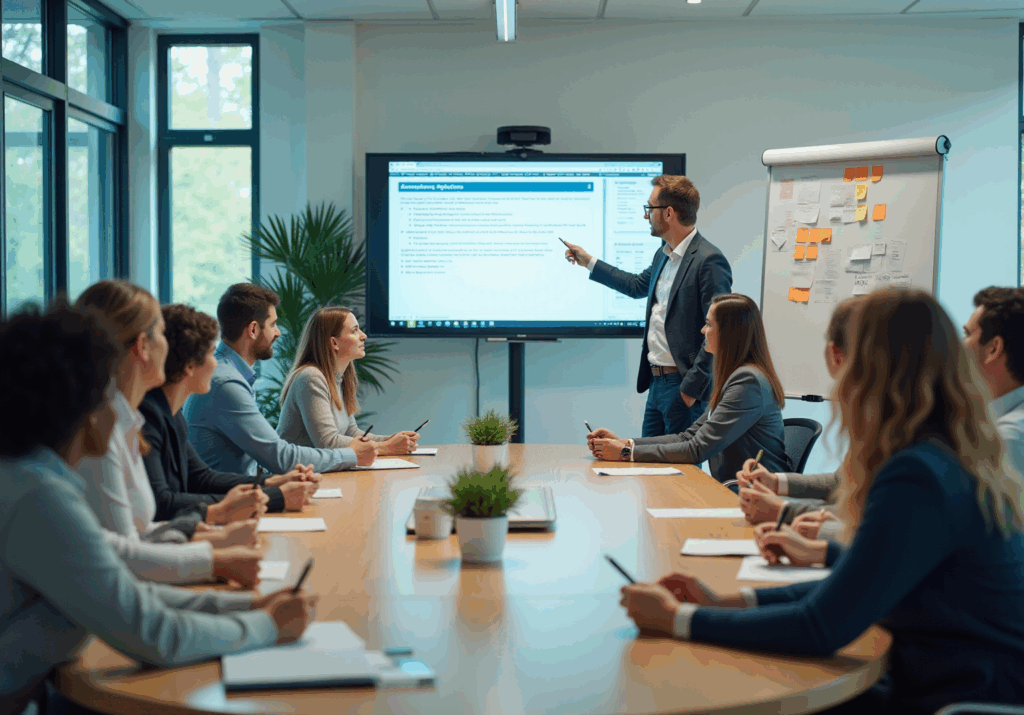
Overview
The article addresses the critical issue of communication inefficiencies that hinder operational success within organizations. It asserts that effective meeting management is paramount, highlighting that:
- Clear objectives
- Organized agendas
- Participant engagement
- Time management
- Follow-up mechanisms
are essential components. Research substantiates this claim, indicating that well-coordinated meetings can lead to a ten percent increase in overall productivity. By implementing these best practices, organizations can significantly enhance productivity and employee satisfaction, ultimately driving operational efficiency.
In today’s fast-paced business environment, the ability to conduct effective meetings is not just beneficial but essential. Organizations that prioritize meeting management will find that it not only streamlines communication but also fosters a culture of collaboration and accountability. The unique features of structured meetings—such as defined roles and responsibilities—create an environment where every participant feels valued and engaged.
To truly capitalize on these benefits, organizations must take action. Exploring the extension of these meeting coordination strategies can provide the necessary tools and insights to transform meeting culture. By adopting these practices, organizations can expect not only improved outcomes but also a more engaged workforce.
Introduction
Effective meeting coordination often stands as the unsung hero of organizational success, quietly driving productivity and fostering collaboration among teams. In an era where businesses navigate the complexities of modern operations, the ability to conduct well-structured meetings emerges as a critical skill that significantly enhances employee engagement and satisfaction. However, with statistics revealing that a staggering percentage of professionals view meetings as obstacles to productivity, organizations face a pressing question: how can they transform their meeting culture from a time-consuming necessity into a powerful tool for operational excellence?
Understand the Importance of Meeting Coordination
Meeting coordination is essential for organizational success, ensuring alignment among participants regarding objectives, agendas, and outcomes. Effective collaboration minimizes misunderstandings and delays, fostering a culture of teamwork that enhances employee engagement. Administrative Assistants are vital in managing schedules and preparing for gatherings, while Team Leaders and Project Managers play a key role in meeting coordination to ensure productive sessions. Organizations that prioritize the organization of gatherings often witness a significant increase in employee satisfaction, as team members feel their time is valued and their contributions recognized.
Research from Harvard Business Review highlights that organizations with effective meeting management practices experience a ten percent increase in overall productivity. This improvement can be linked to faster decision-making processes and enhanced responsiveness to market shifts and internal challenges. Additionally, leveraging tools like Doodle can streamline the scheduling process, further enhancing efficiency. By recognizing the importance of meeting coordination, entities can establish a foundation for a more effective and fruitful work environment, ultimately fostering operational success.
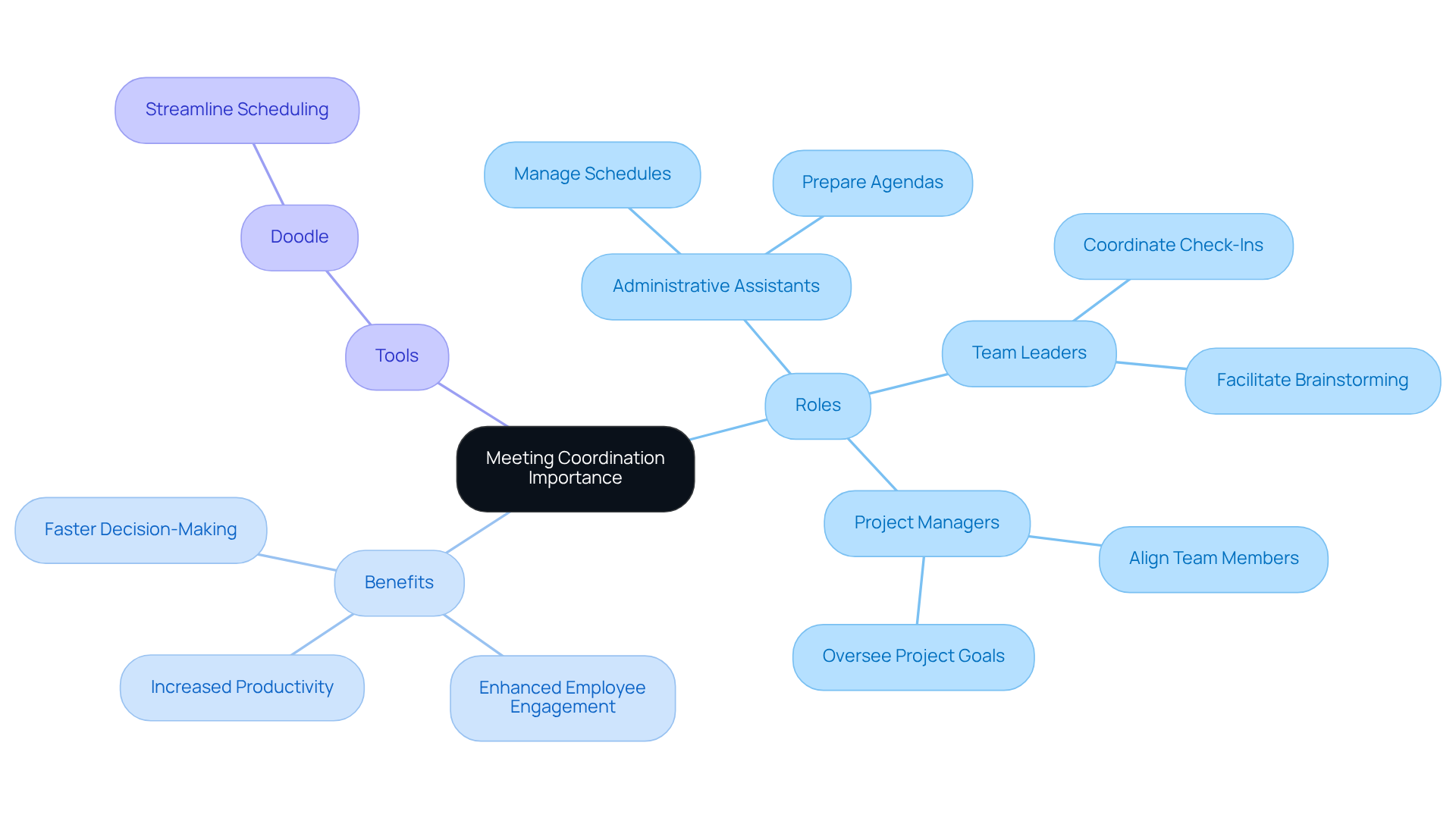
Identify Key Components of Effective Meeting Coordination
Effective meeting coordination hinges on several essential components:
-
Clear Objectives: Every gathering must have a defined purpose and desired outcomes. Studies show that gatherings with defined purposes greatly enhance productivity and align conversations with strategic aims. This clarity allows participants to prepare sufficiently and stay attentive throughout the session.
-
Well-Organized Agenda: A comprehensive agenda functions as the framework for the gathering, detailing subject matters, time distributions, and accountable persons. Well-prepared agendas enhance clarity, speed, and effectiveness, ensuring that each topic receives adequate attention and concludes with actionable steps. For instance, organizations such as Netflix have implemented a maximum duration of 30 minutes for gatherings, emphasizing the need for concise and focused discussions. Notably, Netflix has reduced meetings by more than 65 percent, showcasing the effectiveness of their approach.
-
Engagement of Participants: Identifying and inviting the appropriate individuals is vital for promoting a collaborative environment. Involved attendees provide valuable insights, and restricting the number of individuals to five to seven can improve communication and interaction. This method corresponds with discoveries showing that 71% of senior managers think gatherings obstruct their capacity to accomplish tasks, emphasizing the necessity for careful participant choice and the effect of unproductive assemblies on overall efficiency.
-
Time Management: Valuing participants’ time by commencing and concluding sessions punctually is crucial. This practice not only demonstrates professionalism but also encourages attendance and engagement. Statistics show that professionals invest an average of 31 hours each month in unproductive gatherings, highlighting the significance of efficient time management. As Karin M. Reed observes, “The most impactful gatherings are brief gatherings,” emphasizing the necessity for conciseness in conversations.
-
Follow-Up Mechanisms: Creating a system for follow-up actions and accountability is essential for ensuring that decisions made during discussions are implemented effectively. Regular check-ins on action items can transform discussions into tangible outcomes, driving team and organizational success.
By concentrating on these elements and recognizing typical mistakes, such as inviting excessive participants or neglecting to establish clear goals, organizations can greatly improve their meeting coordination efforts, reclaiming valuable time and boosting overall productivity.
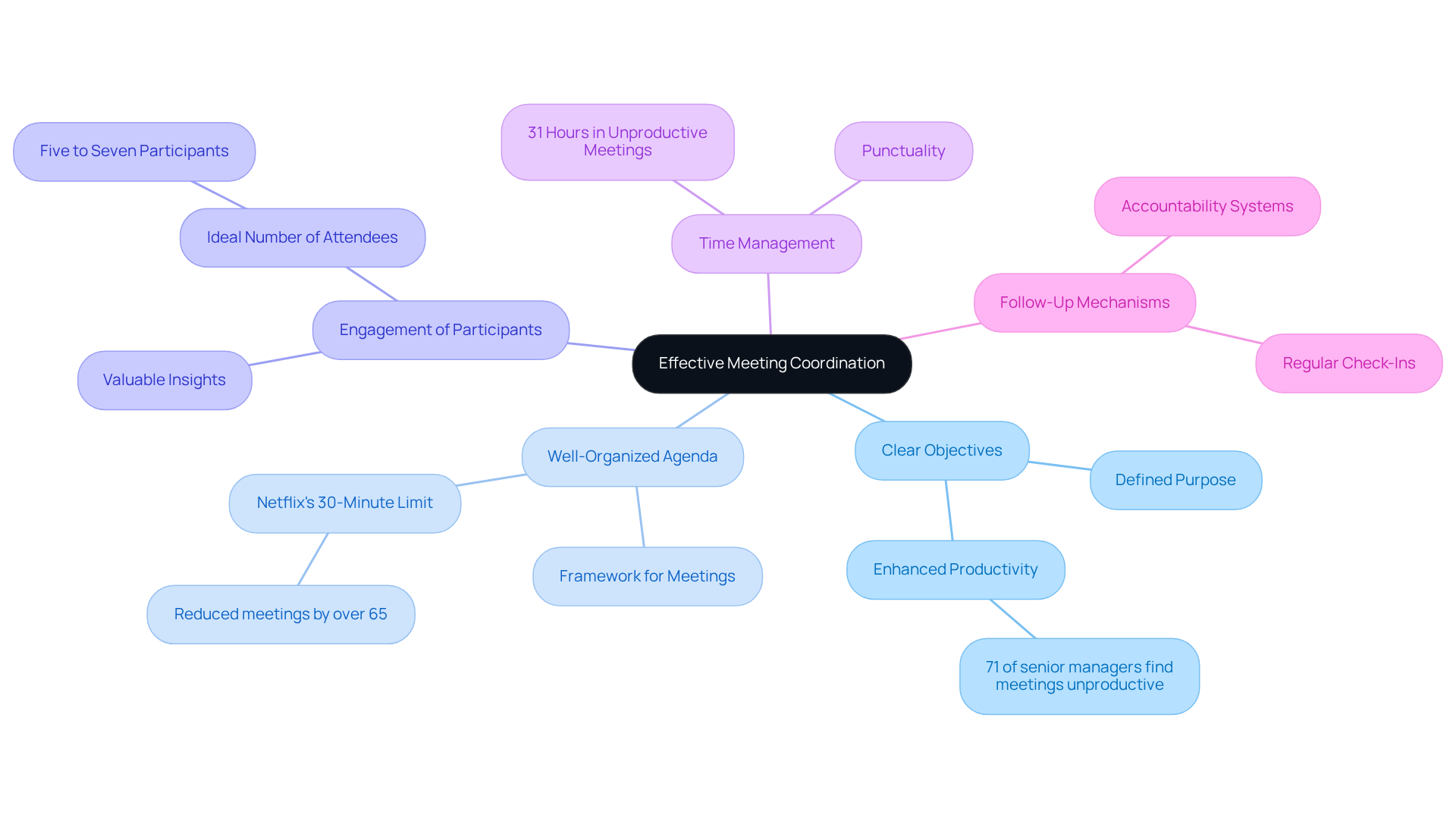
Implement Strategies to Enhance Meeting Coordination Skills
To enhance meeting coordination skills, consider the following strategies:
-
Training and Development: Invest in training programs centered on management and facilitation skills. Workshops can offer attendees the resources and methods required to conduct productive gatherings. This investment not only improves individual capabilities but also elevates the overall effectiveness of meetings.
-
Utilize Technology: Leverage scheduling tools and collaboration platforms to streamline the planning process. Tools such as Schedulelink can simplify scheduling and ensure all attendees are informed. The integration of technology not only saves time but also enhances communication among participants.
-
Practice Active Listening: Motivate attendees to engage in active listening throughout discussions. This skill fosters a respectful environment where everyone feels heard and valued. By cultivating this practice, organizations can significantly improve the quality of interactions during meetings.
-
Request Input: After gatherings, collect opinions from attendees concerning the assembly’s effectiveness. Use this information to make continuous improvements. Gathering feedback not only demonstrates respect for participants’ opinions but also drives the evolution of meeting practices.
-
Role Assignment: Assign specific roles (e.g., facilitator, note-taker, timekeeper) to participants to ensure accountability and organization during discussions. By applying these strategies, organizations can foster a culture of efficient meeting coordination. This structured approach leads to more productive outcomes and a stronger team dynamic.
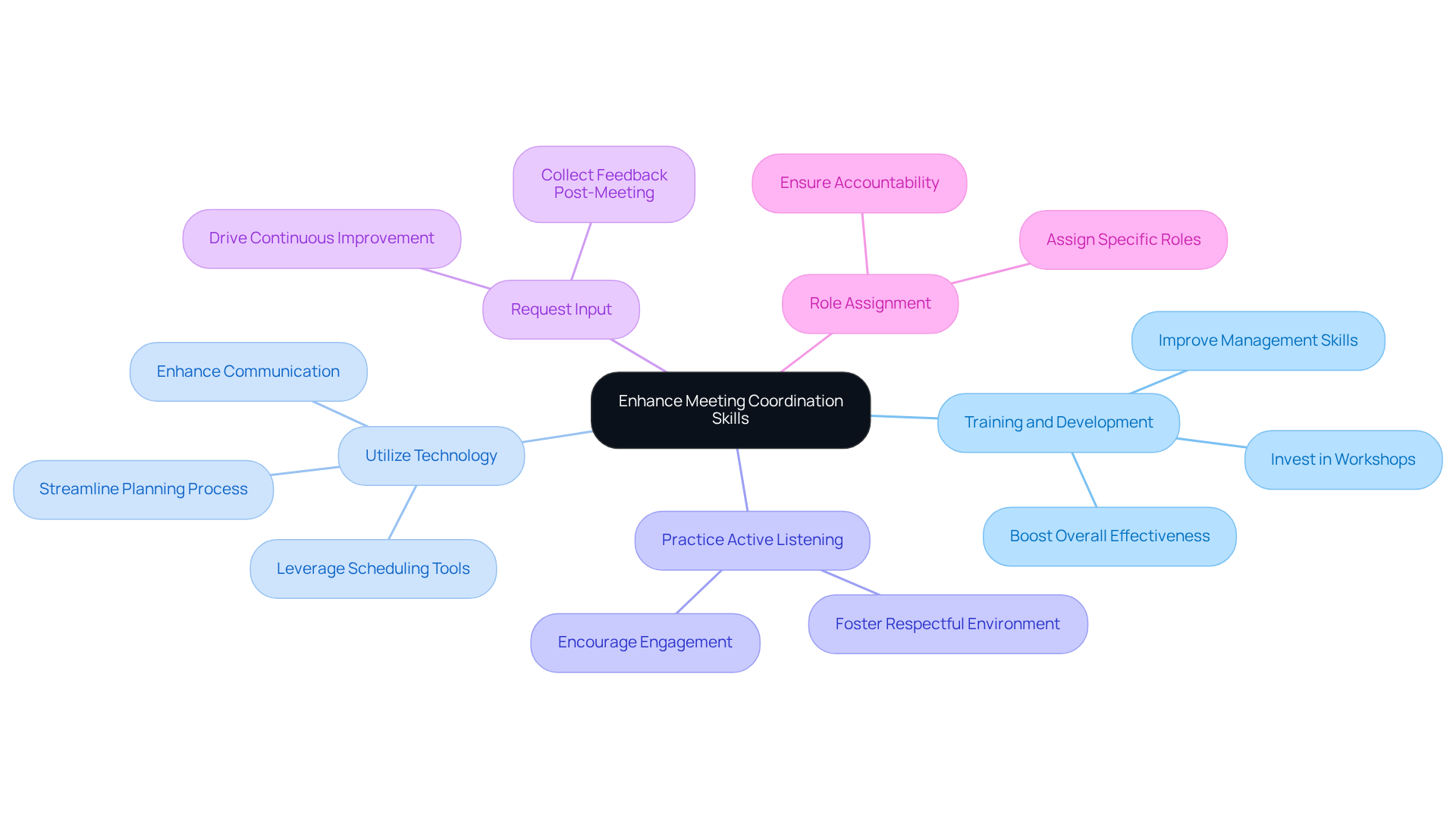
Adopt Best Practices for Meeting Execution and Follow-Up
To ensure successful meeting execution and follow-up, organizations must adopt best practices that address communication inefficiencies and enhance operational effectiveness:
-
Begin with a Recap: Each session should commence with a concise summary of the prior gathering’s key points and action items. This practice not only strengthens accountability but also promotes continuity; indeed, 67% of professionals assert that a clear agenda is essential for productive gatherings.
-
Encourage Participation: It is vital to cultivate an inclusive environment where all participants feel comfortable sharing their thoughts and ideas. Involving diverse perspectives leads to more meaningful conversations and improved results, as 68% of individuals consider gatherings crucial for advancement on team projects.
-
Record Choices and Tasks: Clearly documenting all decisions made during the gathering and assigning tasks to specific individuals with deadlines is imperative. This documentation serves as a crucial reference for future discussions related to meeting coordination, ensuring accountability and clarity. Notably, only 37% of gatherings utilize an agenda, which correlates with increased productivity. As David Smith states, “Enhance your gathering culture with this comprehensive guide to boost efficiency, minimize waste, and promote better communication in your company.”
-
Conduct Post-Session Reviews: Following the session, it is essential to evaluate outcomes and determine if objectives were achieved. This assessment aids in recognizing areas for enhancement in future gatherings, as organizations that optimize their discussion processes can save an estimated $37 billion annually due to inefficiencies. According to a Harvard Business Review study, reducing gathering time by 40% can enhance worker productivity by 70%.
-
Follow-Up on Action Items: Regularly checking in on the progress of action items assigned during discussions reinforces accountability and propels projects forward. Research indicates a significant increase in work-life balance satisfaction among employees, rising from 62% to 92% when gatherings are optimized, underscoring the positive impact of effective follow-up practices. Manuela Bárcenas emphasizes, “Additionally, with Fellow, missed gatherings are not a concern because the central recap library allows employees to catch up on what was overlooked.”
By implementing these best practices, organizations can dramatically enhance their meeting coordination and drive operational success.
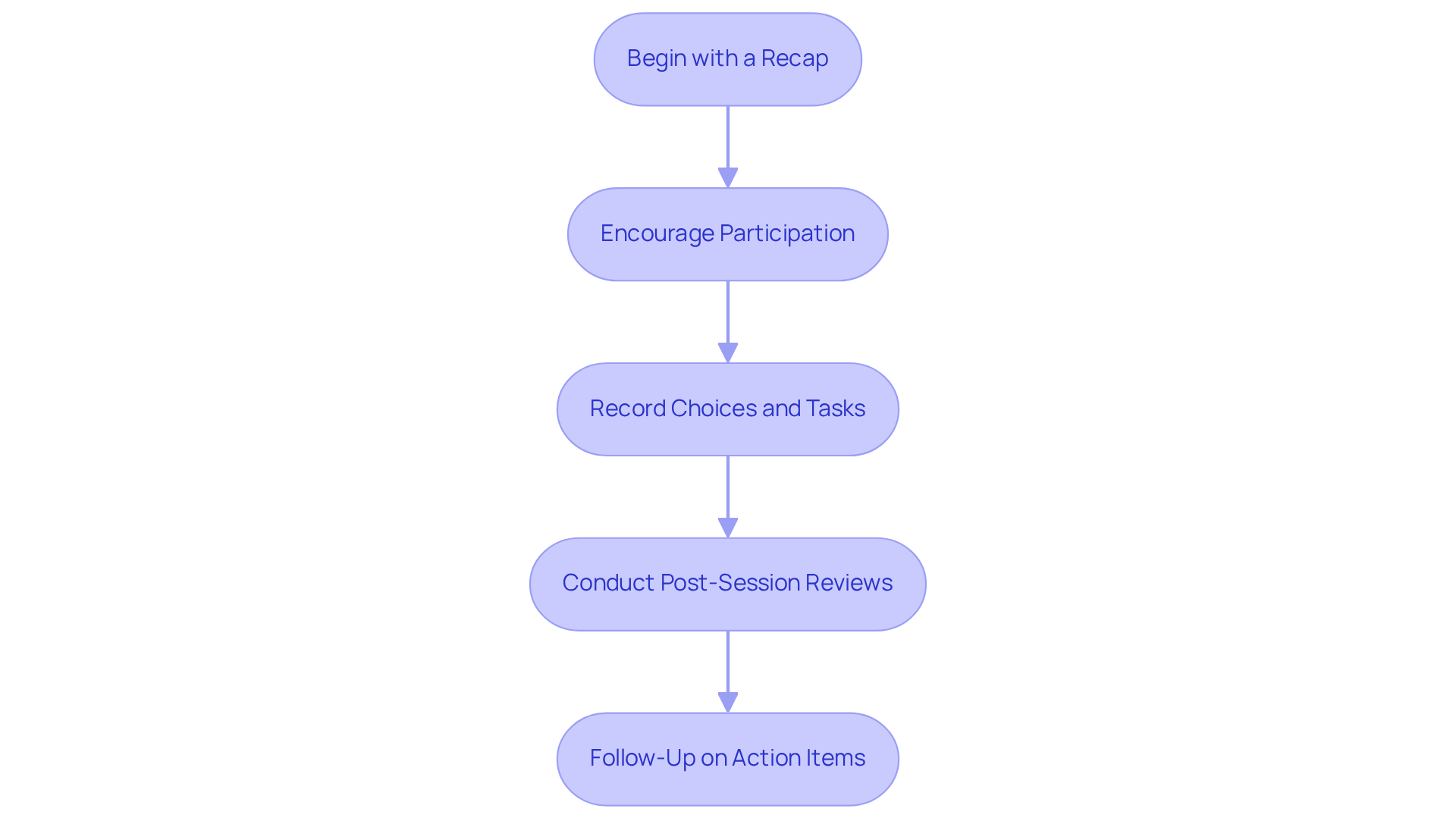
Conclusion
Effective meeting coordination stands as a cornerstone of organizational success, playing a pivotal role in fostering collaboration, enhancing productivity, and ensuring that team members feel valued. Recognizing the significance of well-structured meetings enables organizations to cultivate a culture that prioritizes efficiency and engagement, ultimately leading to improved operational outcomes.
Key components of effective meeting coordination include:
- Establishment of clear objectives
- Importance of a well-organized agenda
- Participant engagement
- Time management
- Robust follow-up mechanisms
Each of these elements contributes to creating a productive meeting environment where decisions can be made swiftly, and team dynamics can flourish.
In light of these insights, organizations must adopt best practices that streamline meeting processes while enhancing the overall effectiveness of their gatherings. By investing in training, utilizing technology, and fostering open communication, teams can transform their meeting culture into one that drives success and satisfaction. Embracing these strategies will optimize meeting outcomes and contribute to a more engaged workforce, underscoring the profound impact of effective meeting coordination on organizational productivity.
Frequently Asked Questions
Why is meeting coordination important for organizations?
Meeting coordination is essential for organizational success as it ensures alignment among participants regarding objectives, agendas, and outcomes, minimizes misunderstandings and delays, and fosters a culture of teamwork that enhances employee engagement.
What roles do Administrative Assistants, Team Leaders, and Project Managers play in meeting coordination?
Administrative Assistants manage schedules and prepare for gatherings, while Team Leaders and Project Managers play key roles in coordinating meetings to ensure productive sessions.
How does effective meeting management impact employee satisfaction?
Organizations that prioritize meeting organization often see a significant increase in employee satisfaction, as team members feel their time is valued and their contributions recognized.
What productivity benefits can organizations experience from effective meeting management?
Research indicates that organizations with effective meeting management practices can experience a ten percent increase in overall productivity, linked to faster decision-making processes and improved responsiveness to market shifts and internal challenges.
What tools can help streamline the meeting scheduling process?
Tools like Doodle can be leveraged to streamline the scheduling process, enhancing efficiency in organizing meetings.
How does meeting coordination contribute to operational success?
By recognizing the importance of meeting coordination, organizations can establish a foundation for a more effective and fruitful work environment, ultimately fostering operational success.
